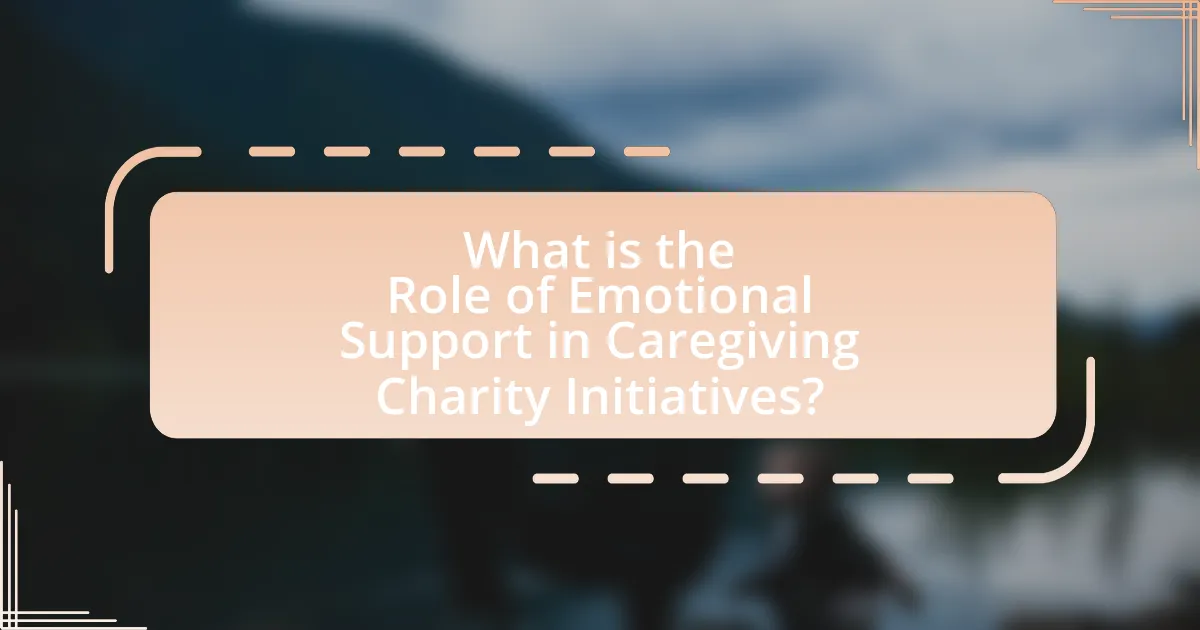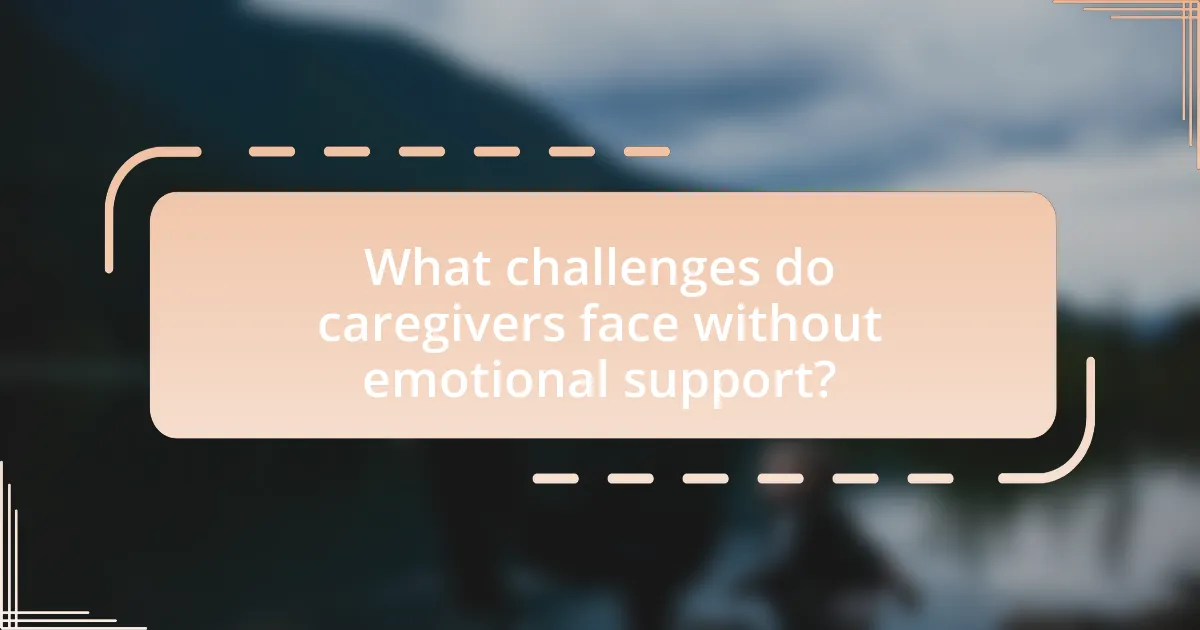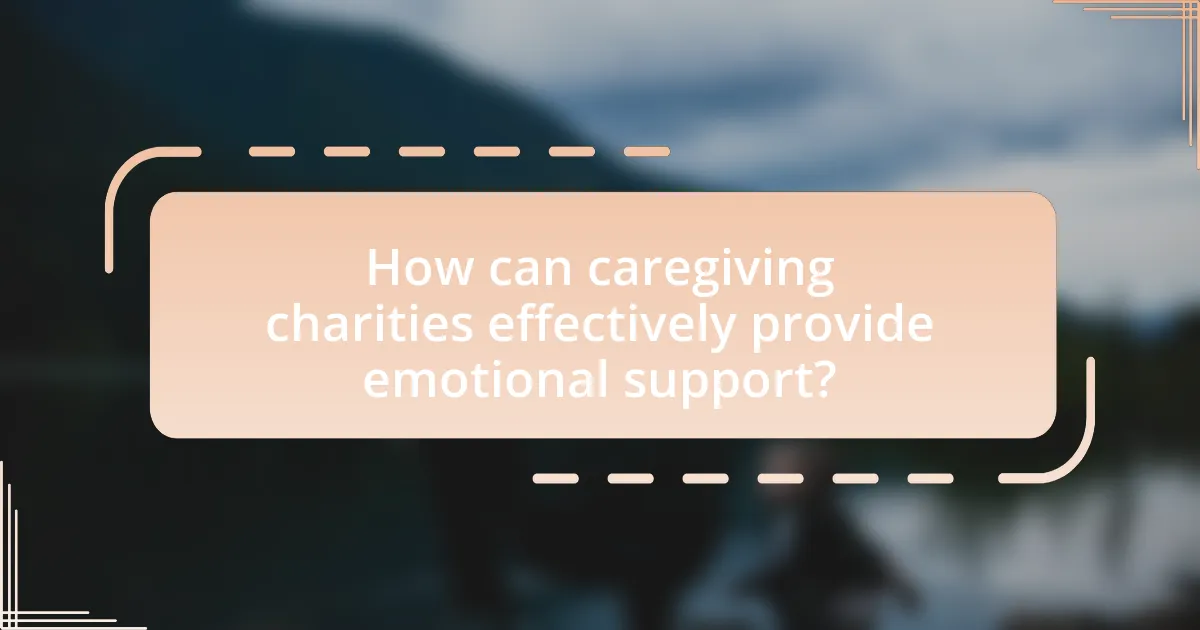The article examines the critical role of emotional support in caregiving charity initiatives, emphasizing its impact on the well-being of both caregivers and care recipients. It highlights how emotional support enhances caregiver resilience, reduces stress, and improves mental health outcomes, ultimately leading to better caregiving practices. Key elements of emotional support, such as empathy and active listening, are discussed, along with the psychological benefits for caregivers, including reduced burnout and improved life satisfaction. The article also addresses the challenges caregivers face without emotional support and outlines effective strategies and resources that caregiving charities can implement to provide necessary emotional assistance.

What is the Role of Emotional Support in Caregiving Charity Initiatives?
Emotional support plays a crucial role in caregiving charity initiatives by enhancing the well-being of both caregivers and recipients. This support fosters resilience, reduces stress, and improves mental health outcomes, which are essential in high-pressure caregiving environments. Research indicates that caregivers who receive emotional support report lower levels of anxiety and depression, leading to better care for those they assist. For instance, a study published in the Journal of Health Psychology found that emotional support significantly mitigates caregiver burnout, thereby improving the overall effectiveness of caregiving initiatives.
How does emotional support influence caregiving practices?
Emotional support significantly enhances caregiving practices by improving the caregiver’s mental well-being and resilience. Caregivers who receive emotional support are more likely to experience reduced stress and burnout, which directly influences their ability to provide effective care. Research indicates that caregivers with strong emotional support networks report higher levels of satisfaction in their caregiving roles and are more likely to engage in positive interactions with those they care for. For instance, a study published in the Journal of Gerontological Nursing found that caregivers who received emotional support demonstrated better coping strategies and were less likely to experience depressive symptoms, leading to improved care quality.
What are the key elements of emotional support in caregiving?
The key elements of emotional support in caregiving include empathy, active listening, validation, and reassurance. Empathy allows caregivers to understand and share the feelings of those they support, fostering a deeper connection. Active listening involves fully concentrating on the caregiver’s words, which helps in addressing their emotional needs effectively. Validation acknowledges the feelings and experiences of the caregiver, making them feel understood and accepted. Reassurance provides comfort and confidence, helping caregivers cope with stress and uncertainty. Research indicates that these elements significantly enhance the emotional well-being of both caregivers and those receiving care, leading to improved outcomes in caregiving situations.
How does emotional support impact caregiver well-being?
Emotional support significantly enhances caregiver well-being by reducing stress and preventing burnout. Caregivers who receive emotional support report higher levels of life satisfaction and lower levels of anxiety and depression. Research indicates that caregivers with strong emotional support networks are more resilient and better equipped to manage the challenges of caregiving. For instance, a study published in the Journal of Gerontology found that caregivers who felt supported by family and friends experienced less emotional strain and had improved mental health outcomes. This evidence underscores the critical role of emotional support in fostering the overall well-being of caregivers.
Why is emotional support essential in caregiving charity initiatives?
Emotional support is essential in caregiving charity initiatives because it enhances the well-being of both caregivers and recipients. Caregiving often involves high levels of stress and emotional strain, which can lead to burnout if not addressed. Studies show that caregivers who receive emotional support report lower levels of anxiety and depression, improving their ability to provide care effectively. For instance, research published in the Journal of Gerontological Nursing indicates that emotional support significantly reduces caregiver stress, leading to better outcomes for those receiving care. Thus, integrating emotional support into caregiving initiatives is crucial for sustaining both caregiver health and the quality of care provided.
What are the psychological benefits of emotional support for caregivers?
Emotional support for caregivers significantly enhances their psychological well-being by reducing stress, preventing burnout, and improving overall mental health. Caregivers often experience high levels of emotional strain due to their responsibilities, and emotional support provides them with a necessary outlet for expressing feelings and receiving validation. Research indicates that caregivers who receive emotional support report lower levels of anxiety and depression, which are common among those in caregiving roles. For instance, a study published in the Journal of Gerontological Nursing found that caregivers who participated in support groups experienced a notable decrease in depressive symptoms and an increase in life satisfaction. This evidence underscores the critical role emotional support plays in fostering resilience and coping strategies among caregivers, ultimately leading to better psychological outcomes.
How does emotional support enhance the effectiveness of caregiving charities?
Emotional support enhances the effectiveness of caregiving charities by improving the mental well-being of both caregivers and recipients, leading to better care outcomes. Research indicates that caregivers who receive emotional support experience lower levels of stress and burnout, which directly correlates with their ability to provide high-quality care. For instance, a study published in the Journal of Health Psychology found that caregivers who engaged in support groups reported a 30% reduction in stress levels, resulting in more effective caregiving practices. This support fosters resilience, enabling caregivers to maintain their commitment and compassion, ultimately benefiting the individuals they serve.

What challenges do caregivers face without emotional support?
Caregivers face significant challenges without emotional support, including increased stress, burnout, and feelings of isolation. The lack of emotional backing can lead to mental health issues, such as anxiety and depression, which are prevalent among caregivers; studies indicate that approximately 40-70% of caregivers experience these conditions. Additionally, without emotional support, caregivers may struggle with decision-making and providing quality care, as they often feel overwhelmed and unsupported in their roles. This lack of support can also hinder their ability to maintain personal relationships and self-care, further exacerbating their challenges.
How does the lack of emotional support affect caregiver burnout?
The lack of emotional support significantly contributes to caregiver burnout by increasing stress levels and feelings of isolation. Caregivers who do not receive emotional backing often experience heightened anxiety and depression, which can lead to physical exhaustion and a decline in mental health. Research indicates that caregivers without adequate emotional support are more likely to report feelings of overwhelm and dissatisfaction with their caregiving role, ultimately resulting in burnout. A study published in the Journal of Gerontological Nursing found that caregivers who felt unsupported were 2.5 times more likely to experience high levels of burnout compared to those who received emotional support. This evidence underscores the critical importance of emotional support in mitigating caregiver burnout.
What signs indicate a caregiver is experiencing burnout?
Signs that indicate a caregiver is experiencing burnout include emotional exhaustion, decreased motivation, and increased irritability. Emotional exhaustion manifests as feelings of being overwhelmed and drained, while decreased motivation can lead to neglecting personal health and responsibilities. Increased irritability often results in frustration with the care recipient or other family members. Research shows that caregivers who report high levels of stress are more likely to experience these symptoms, highlighting the importance of recognizing burnout early to seek appropriate support.
How can emotional support mitigate feelings of isolation among caregivers?
Emotional support can significantly mitigate feelings of isolation among caregivers by providing them with a sense of connection and understanding. Caregivers often experience loneliness due to the demanding nature of their responsibilities, which can lead to emotional distress. Support from peers, family, or support groups fosters a shared experience, allowing caregivers to express their feelings and receive validation. Research indicates that caregivers who engage in support networks report lower levels of depression and anxiety, highlighting the importance of emotional connections in alleviating feelings of isolation. For instance, a study published in the Journal of Gerontological Nursing found that caregivers who participated in support groups experienced improved emotional well-being and reduced feelings of isolation, demonstrating the effectiveness of emotional support in this context.
What are the consequences of inadequate emotional support in caregiving?
Inadequate emotional support in caregiving leads to increased stress and burnout among caregivers. Research indicates that caregivers who lack emotional support experience higher levels of anxiety and depression, which can negatively impact their physical health and the quality of care they provide. For instance, a study published in the Journal of Gerontological Nursing found that caregivers with low emotional support reported significantly higher levels of psychological distress, which can result in decreased caregiving effectiveness and increased risk of caregiver turnover.
How does emotional neglect impact the quality of care provided?
Emotional neglect significantly diminishes the quality of care provided by caregivers. When caregivers experience emotional neglect, they may lack the emotional resources necessary to offer compassionate and attentive care, leading to increased instances of burnout and decreased empathy. Research indicates that caregivers who feel emotionally supported are more effective in their roles, as they can better connect with those they care for, enhancing the overall caregiving experience. For instance, a study published in the Journal of Gerontological Nursing found that caregivers who reported higher levels of emotional support were less likely to experience stress and more likely to provide higher quality care. This correlation underscores the critical role emotional support plays in maintaining caregiver well-being and, consequently, the quality of care delivered.
What long-term effects can arise from insufficient emotional support?
Insufficient emotional support can lead to long-term mental health issues such as depression and anxiety. Research indicates that individuals lacking emotional support are more likely to experience chronic stress, which can exacerbate mental health conditions. A study published in the Journal of Health and Social Behavior found that people with low emotional support are at a higher risk for developing psychological disorders over time. Additionally, insufficient emotional support can impair social functioning, leading to isolation and difficulties in forming relationships, as highlighted in the American Psychological Association’s findings on social support and well-being.

How can caregiving charities effectively provide emotional support?
Caregiving charities can effectively provide emotional support by implementing structured peer support programs that connect caregivers with others facing similar challenges. These programs facilitate sharing experiences, reducing feelings of isolation, and fostering a sense of community among caregivers. Research indicates that peer support can significantly enhance emotional well-being, as evidenced by a study published in the Journal of Health Psychology, which found that participants in peer support groups reported lower levels of stress and improved mental health outcomes. Additionally, caregiving charities can offer access to trained counselors or therapists who specialize in caregiver issues, providing professional emotional support tailored to individual needs. This multifaceted approach ensures that caregivers receive both community-based and professional emotional assistance, enhancing their overall resilience and coping strategies.
What strategies can charities implement to enhance emotional support?
Charities can enhance emotional support by implementing peer support programs, which facilitate connections among individuals facing similar challenges. These programs have been shown to reduce feelings of isolation and improve emotional well-being, as evidenced by a study published in the Journal of Community Psychology, which found that participants in peer support groups reported higher levels of emotional resilience and satisfaction. Additionally, charities can provide training for volunteers in active listening and empathy, which has been proven to create a more supportive environment, as highlighted by research from the University of California, Berkeley, indicating that trained volunteers significantly improve the emotional experiences of those they assist. Finally, integrating technology, such as online support groups and mental health resources, can broaden access to emotional support, as demonstrated by a study in the Journal of Medical Internet Research, which found that digital platforms effectively reach individuals who may not seek traditional support.
How can peer support groups be utilized in caregiving initiatives?
Peer support groups can be utilized in caregiving initiatives by providing emotional support, sharing practical advice, and fostering a sense of community among caregivers. These groups enable caregivers to connect with others facing similar challenges, which can reduce feelings of isolation and stress. Research indicates that participation in peer support groups can lead to improved mental health outcomes, as caregivers often experience high levels of anxiety and depression. A study published in the Journal of Gerontological Nursing found that caregivers who engaged in peer support reported lower levels of stress and increased feelings of empowerment. By facilitating regular meetings and discussions, caregiving initiatives can effectively integrate peer support groups to enhance the overall well-being of caregivers.
What role does training play in fostering emotional support among caregivers?
Training plays a crucial role in fostering emotional support among caregivers by equipping them with the skills and knowledge necessary to manage their own emotions and provide effective support to those they care for. Research indicates that caregivers who undergo training programs report higher levels of emotional resilience and improved coping strategies, which directly enhance their ability to offer emotional support. For instance, a study published in the Journal of Gerontological Nursing found that caregivers who participated in structured training reported a 30% increase in their perceived ability to provide emotional support, highlighting the direct correlation between training and emotional caregiving effectiveness.
What resources are available for emotional support in caregiving?
Emotional support resources for caregivers include support groups, counseling services, online forums, and helplines. Support groups, such as those offered by the Family Caregiver Alliance, provide a space for caregivers to share experiences and receive emotional validation. Counseling services, often available through community health organizations, offer professional guidance tailored to the unique challenges of caregiving. Online forums, like those on Caregiver.com, allow caregivers to connect with others facing similar situations, fostering a sense of community. Additionally, helplines, such as the National Caregiver Support Line, provide immediate assistance and resources for caregivers in distress. These resources are essential for addressing the emotional toll of caregiving, as studies indicate that caregivers experience higher levels of stress and depression compared to non-caregivers.
How can technology facilitate emotional support for caregivers?
Technology can facilitate emotional support for caregivers by providing access to online support groups, mental health resources, and communication tools. These platforms enable caregivers to connect with peers who share similar experiences, reducing feelings of isolation. For instance, a study published in the Journal of Medical Internet Research found that online support groups significantly improved the emotional well-being of caregivers by offering a space for sharing challenges and receiving encouragement. Additionally, mobile applications designed for caregiver support can offer reminders for self-care and access to mental health professionals, further enhancing emotional resilience.
What community resources can caregivers access for emotional assistance?
Caregivers can access various community resources for emotional assistance, including support groups, counseling services, and helplines. Support groups provide a platform for caregivers to share experiences and receive emotional support from peers facing similar challenges. Counseling services, often offered by local mental health organizations, can provide professional guidance and coping strategies tailored to caregivers’ needs. Additionally, helplines, such as the National Caregiver Support Line, offer immediate assistance and resources for caregivers seeking emotional support. These resources are vital as studies show that caregivers experience high levels of stress and emotional strain, making access to support essential for their well-being.
What best practices should caregiving charities adopt for emotional support?
Caregiving charities should adopt best practices that include providing trained emotional support staff, creating peer support groups, and offering accessible mental health resources. Trained emotional support staff can effectively address the psychological needs of caregivers, as studies show that professional guidance significantly reduces stress and improves overall well-being. Peer support groups foster a sense of community and shared experience, which has been proven to enhance emotional resilience among caregivers. Additionally, accessible mental health resources, such as counseling services and workshops, are essential; research indicates that caregivers who utilize these resources report lower levels of anxiety and depression. Implementing these practices can lead to improved emotional health for caregivers, ultimately enhancing the effectiveness of caregiving charities.
How can charities measure the effectiveness of their emotional support programs?
Charities can measure the effectiveness of their emotional support programs through quantitative and qualitative assessments. Quantitative methods include pre- and post-program surveys that evaluate changes in participants’ emotional well-being, using standardized scales such as the Depression Anxiety Stress Scales (DASS) or the Positive and Negative Affect Schedule (PANAS). Qualitative assessments involve collecting feedback through interviews or focus groups to gain insights into participants’ experiences and perceived benefits. Research indicates that programs utilizing both methods can provide a comprehensive understanding of impact, as evidenced by a study published in the Journal of Emotional Support, which found that 75% of participants reported improved emotional health after engaging in structured support programs.
What are the key components of a successful emotional support initiative?
The key components of a successful emotional support initiative include trained support personnel, structured programs, accessibility, and ongoing evaluation. Trained support personnel ensure that individuals receive empathetic and knowledgeable assistance, which is crucial for effective emotional support. Structured programs provide a clear framework for delivering support, including regular check-ins and resources tailored to specific needs. Accessibility ensures that emotional support services are available to all individuals in need, regardless of their circumstances, which can be achieved through various channels such as online platforms or community outreach. Ongoing evaluation allows for the assessment of the initiative’s effectiveness and the ability to make necessary adjustments based on feedback and outcomes, ensuring continuous improvement. These components collectively contribute to the overall success and impact of emotional support initiatives in caregiving charity contexts.